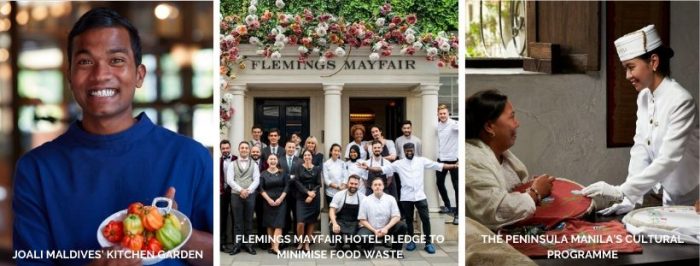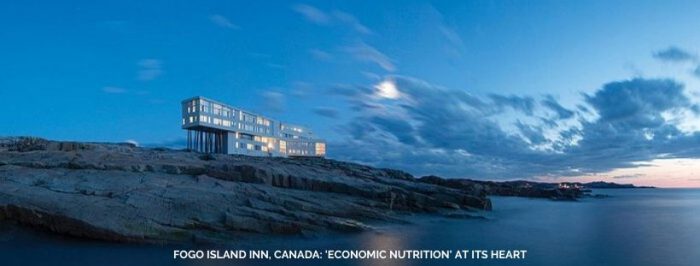
The global pandemic has given us an opportunity to re-think many aspects of travel. In our latest Insights discussion, we ask Juliet Kinsman, Conde Nast Traveller‘s first ever sustainability editor, Xenia Hohenlohe, the founding partner of Considerate Hoteliers and Jean-Francois Ferret, CEO of Small Luxury Hotels to join Maria Pajares, Mason Rose’s MD and Fran Gosling, from our PR division, to address the burning questions in responsible travel now. Sharing opinion, expertise and practical ideas, these three speakers outline how hospitality can be a force for good.

THE SITUATION: How has the pandemic accelerated the drive for change and for a more sustainable world?
- It has put a spotlight on the socio-economic inequality in the world and raised issues of community within the sustainability story
- Travel is the perfect opportunity to lead the way in awareness and diversity
- It has presented the chance for hotels to look at how they engage with the emotions and needs of responsible travellers
“Are staff members the new travel ambassadors? Are we promoting faraway places as exotic because they are different or is it time to focus instead on common humanity?” JK
HYGIENE: will new health & safety requirements require more wasteful practices?
“The world has changed since the epidemic. We have experienced constraints, now should swich constraints into opportunities.” J-FF
- Hygiene is the ‘new currency of the new normal’
- Opportunity to use innovative technology rather than toxic chemicals and disposable plastics e.g. UV light/electrostatically charged mists/self-cleaning wall coatings for sterilisation, also virtual or touch-free check-in and personalised concierge apps
- Some elements of new Health & Safety measures will naturally be more sustainable e.g. amenities being on request only
- The luxury/boutique customer will still want the hotel experience rather than a trip to an upmarket hospital, so a more holistic sense of trust will be key
- Better to focus on one or two things a hotel really cares about and can do well
- Easier wins are reducing pollution and waste, but effective carbon offsetting requires investment and long-term thinking

CONSUMERS: how will the luxury traveller’s behaviour have changed? Will people make travel choices in a more considered way and in particular as regards to sustainability?
- Healthy & safety will be the first priority for travel in the short term
- We’ll see changes in consumers’ ideas of what luxury is: not necessarily in the use of piles of towels and single-use plastics, but moreover in beautifully-produced, authentic, local things
- Travellers more likely to crave experiences over material things post-lockdown so an opportunity to really highlight authentic offerings
- An increased appetite for holidays that enhance health (wellbeing to have a focus on outdoor adventure and personalised spa treatments / chance for F&B to focus on local produce, perhaps less meat)
- Over-tourism replaced by under-tourism: chance to promote lesser-known nearby destinations and partners
- Predicted increase in last-minute bookings
- Money and value may be an issue for travellers and depending on how people have financially weathered lockdown, some may still favour lower price points over positive eco credentials
- Global and cultural differences means that some travellers are more “woke” than others. There is an element of education as well as explanation that needs to be addressed through open communication – where do hotels communicate their sustainability stories?

HOTELIERS: Top tips for hoteliers who wish to be as sustainable as possible as they plan for re-opening and of course beyond. How can hotels stand out as forward-thinkers in terms of sustainability? What to consider in planning:
“From the website to waste disposal. Consideration should be given to sustainable practices at every level of a hotel’s operation” XH
- ‘Co-ompetition’ eg: collaborating with other hoteliers and suppliers within your network
- Bottom-up planning and buy-in eg: involving staff at all levels and asking for their ideas/what’s important to them (especially now there is the opportunity to do so)
- Transparent engagement with guests that focus on ‘people’s stories’
- More focus on the benefits of travel to the traveller in terms of spending genuine time talking to people locally, understanding we are one and the same, albeit with diverse backgrounds
- Looking at ways to create circular economies and better systems – like local sourcing and working with communities, over focusing on “stuff” like free gifts in rooms. Using traceable and ethical suppliers. Managing waste e.g. sending cooking oils for energy, grey water for gardening, up-cycling furniture
- Wealth distribution: how much is going to labour and local community
- Supporting diversity in the workforce and being conscious of diversity in your marketing
- Focus on staff and mental health of employees after a difficult period
“Focus on a few manageable aspects – eg water or education” JK

FINANCES: From an economic perspective, what are the benefits of more sustainable practices?
- Cost savings on minimising food waste
- Circular economies / local sourcing that reflect the holistic efficiency of nature and sustain / build communities
- EU Green Deals will be putting fines on unsustainable practices
- Looking for healthy & safety measures that are no more expensive, like swapping disposable amenities for re-usable products, made locally
- Changing mindsets from solving problems with more “things” to introducing better streamlined systems from procurement-to-waste (even if they require investment at the start)
- Hospitality investors are now directly seeking businesses with strong CSR principles and sustainable practices

COMMUNICATION: Is your sustainability message easy to find on your website?
- Staff are your greatest ambassadors – hotels with genuine and positive practices are evident in the way staff themselves speak about the property and how they engage with guests about sustainability
- Storytelling – language is very important: be honest, specific and inclusive
- Take a stand: some hotels, like Fogo Island in Newfoundland share financial transparency to show guests a breakdown of where their money goes and how much is invested locally, which they call ‘ECONOMIC NUTRITION’
- Engaging older/traditional clientele: be patient. Introduce guests to specific people and share their stories to make things relatable. Build sustainability stories into multi-generational experiences
CERTIFICATION: How to choose which sustainability certification is right for your hotel:
- It’s possible to join organisations such as Wayaj to be listed as eco-friendly. Other stamps e.g. EarthCheck, B Corps, GreenKey/GRESB but it is complicated to navigate these as there are over 800
- Important to research and focus on the right ones that say the most about your property and destination, and that fit in with your brand purpose
- Prioritise national stamps as a general rule of thumb as are likely to be most relevant

About our speakers:
Writer, editor, broadcaster, speaker and consultant, Juliet Kinsman’s career in travel covers every aspect of independent, conscious travel. Just announced as Conde Nast Traveller‘s first-ever sustainability editor, Juliet is the co-founder of Bouteco and was the founding editor of Mr & Mrs Smith boutique hotels. Her latest book The Green Edit: Travel is published this Autumn.
Jean-Francois Ferret, CEO of Small Luxury Hotels (SLH) a community of independently minded travellers and independently spirited hotels in the world. Each of the 550 hotels in more than 90 countries has been personally visited, verified and verified by the SLH team. SLH have just launched new standards for conscious travel which will formalise their commitment as a business to sustainability. Showcasing hotels initiatives and activities to inspire others, whilst providing guidelines for those hotels looking to take positive action and expand their sustainability programmes.
Xenia Hohenlohe, the founding partner of Considerate Hoteliers, a specialist company that helps hospitality businesses operate responsibly. The in-house team comprises experts with extensive hospitality industry knowledge and experience; sustainability analysts; and engineers. The Considerate client portfolio includes boutique hospitality brands; many of London’s flagship properties; national and international hotel groups; management companies; and private Islands. The company has developed Con-Serve™ by Considerate is ISO 50001 certified as an energy management system.
Mason Rose have been representing hotels and hospitality for over 25 years. Over the decades so much has changed in travel, so we continue to look forwards, seek out opportunities and keep connections alive. Please get in touch if we can help you communicate your hotel’s story more effectively and enable you to reach the right audiences. We’d be delighted to speak to you.
Maria Pajares: maria@masonrose.com
www.masonrose.com
